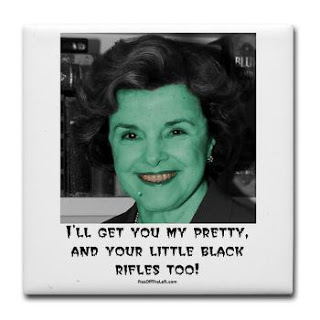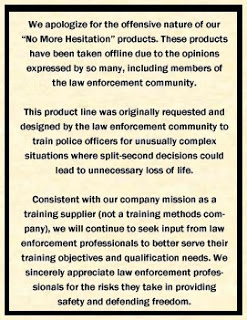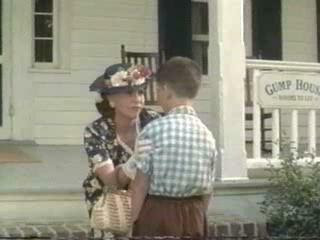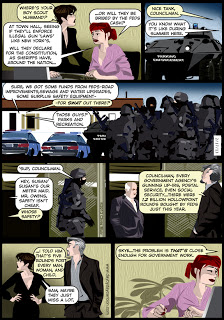The ORIGINAL gathering place for a merry band of Three Percenters. (As denounced by Bill Clinton on CNN!)
Thursday, February 28, 2013
20th Anniversary of initial Waco raid.
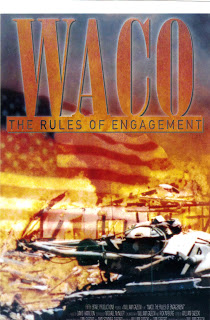
My heart is too heavy at the moment to write about this. I'll have more in the next William Diamond's Drum.
New York Times editorial board puts themselves further ahead in competition for a future Julius Streicher Award.
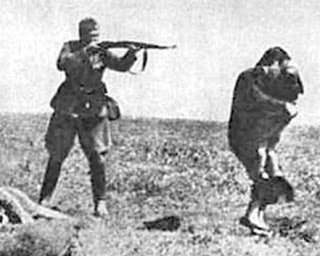
The New York Times says:
The dark and nonsensical fantasy that the United States government will one day transform itself into a jackbooted fascist state and seize American weaponry has long been peddled by the gun lobby to stir up donations to its cause. It is the reason the federal background check system is not allowed to keep records of people who are approved to buy guns — advocates claimed that doing so would lead to a national gun registry and thus a road map for the storm troopers to know whose door to kick down in their rabid search for a revolver.
On the other hand, I wrote this almost 14 years ago:
As an amateur historian of this sad century whose time is almost up, I would like to reflect upon six lessons I have learned in my studies. Folks who wish to live free and prosperous in the next century would do well to understand the failures of the past.LESSON NO. 1: If a bureaucrat, or a soldier sent by a bureaucrat, comes to knock down your door and take you someplace you do not want to go because of who you are or what you think -- kill him. If you can, kill the politician who sent him. You will likely die anyway, and you will be saving someone else the same fate. For it is a universal truth that the intended victims always far outnumber the tyrant's executioners. Any nation which practices this lesson will quickly run out of executioners and tyrants, or they will run out of it.LESSON NO. 2: If a bureaucrat, or a soldier sent by a bureaucrat, comes to knock down your door and confiscate your firearms -- kill him. The disarmament of law-abiding citizens is the required precursor to genocide.LESSON NO. 3: If a bureaucrat tells you that he must know if you have a firearm so he can put your name on a list for the common good, or wants to issue you an identity card so that you be more easily identified -- tell him to go to hell. Registration of people and firearms is the required precursor to the tyranny which permits genocide. Bureaucrats cannot send soldiers to doors that are not on their list.
Of course, the New York Times editorial board has long been seeking a future Julius Streicher Award for criminal collectivism in service of proposed tyranny. Sad to say, one day they might win it with the civil war they solicit.
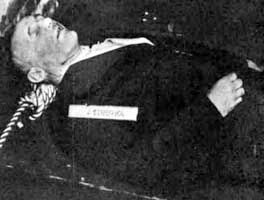
There is no house rule that prohibits tyranny coming to America. Nor is there any historical principle which will prevent the lickspittles of tyranny from being dealt with by an enraged population of intended victims after that tyranny is overthrown. Indeed, history is replete with such examples. For there is certainly the ironclad Law of Unintended Consequences. Julius Streicher, Hitler's favorite journalist, found that out.
Don't worry, Guvs, you can still start a civil war with what you CAN pass.
From Politico: Democratic governors fear gun reform moment has passed.
Gun-control advocates hoped the shattering December murder of 20 first-graders in Newtown, Conn., would upend the de facto non-aggression pact on federal gun laws that both political parties have consented to in the last decade. But now that expanded background checks seem to be the only initiative that may pass Congress, the most powerful bloc of gun-control proponents in the country is conceding that the gripping sense of outrage following the Sandy Hook massacre has ebbed.Democratic governors fault Washington lawmakers for not acting more aggressively but, more strikingly, some even point a finger at Americans themselves for not keeping up the pressure on elected officials. . .But governors aren’t waiting on the Beltway politics of guns to change.So, instead of waiting on piecemeal legislation from Washington, some Democratic governors are moving to implement firearms restrictions in their own states that almost certainly could never pass the Republican-controlled House or a Senate with a bipartisan consensus on gun rights. . .While they want more, the pro-gun control Democratic governors believe even incremental progress in Washington this year could breathe life back into the issue.“I think the president can’t stop talking about it…and if he gets universal background checks, it gives momentum to states to do more,” said O’Malley.
Wednesday, February 27, 2013
William Diamond's Drum, Part Four: "Nativist Craziness," Resistance, Compromise and Cowardice.
I laughed when I read that Magpul has one final slap at the state authorities of Colorado before voting with their feet and taking many jobs with them to a freer clime:
Good on 'em. Meanwhile, Politico reports that Obama's gun strategy falling short in Senate.We are proud to announce that within a matter of days we will be going live with a new program. Due to a bill currently moving through the Colorado legislature, there is the possibility that Colorado residents' ability to purchase standard capacity magazines will soon be infringed. Before that happens, and Magpul is forced to leave the state in order to keep to our principles, we will be doing our best to get standard capacity PMAGs into the hands of any Colorado resident that wants them.Verified Colorado residents will be able to purchase up to ten (10) standard capacity AR/M4 magazines directly from Magpul, and will be given immediate flat-rate $5 shipping, bypassing our current order queue.Our customers outside of Colorado, please know that our PMAG production will continue at an ever-increasing rate until we do relocate, shipments to our distributors in other states will continue, and that we do not expect relocation to significantly impact PMAG production. We are also aware that Colorado is not the only state with existing or pending magazine capacity restrictions; we are working on programs for other affected states as well. (Emphasis supplied, MBV.)
Another advocate with close ties to the White House effort expressed frustration with the inability to create the bipartisan consensus Obama has praised in public.“There is a sort of nativist craziness from a sort of number of people who never want any of their information about their gun ownership in the hands of the government,” the advocate said. “Those things are hard to deal with because it is essential that those records are kept somewhere.”
"Essential?" To whom? Call me a "nativist crazy" I guess but whatever bill emerges into intolerable act, we will disobey it. William Diamond's drum still sounds the long roll. (See previous parts of this series here,hereand here.)
I was visiting a local gun store on Monday when a man in his forties came in, looking for "a tube I can bury my best guns in." The counterman referred him to nearest surplus store. As he turned to leave, I asked him, "Why do you want to bury your best guns?" He responded, "So I'll still have some after they confiscate the beat-up ones." "And if they do that," I asked, "when do you think it will be safe to dig up the others?" He blinked, twice, then answered, "After all this shit has blown over." I could have argued further, but didn't have the time to waste. He departed, pulling out of the parking lot in the direction of the surplus store.
I was reminded of the framed copy of a Churchill quote that hangs on my wall, presented to me as a thank you by a local candidate for judge who I once helped with his campaign back in the late 90s:
"If you will not fight for the right when you can easily win without bloodshed; if you will not fight when your victory will be sure and not too costly; you may come to the moment when you will have to fight with all the odds against you and only a small chance of survival. There may even be a worse case: you may have to fight when there is no hope of victory, because it is better to perish than to live as slaves."
This thought was kicking around in my brain last night during my regularly scheduled insomnia when I recalled something from one of the books from the list that Doctor Richter had first recommended to me back in the winter of 1976-77: Eric Hoffer's The True Believer. Not from Hoffer's work, but rather from the Introduction by Sidney Hook. Richter also, as I recall, had Hook's The Hero in History on that list.
I remember identifying with Hook as a fellow ex-communist who had seen the light and become a staunch anti-communist. So last night, motivated by this twinkle of a long-ago memory, I rose and went to the shelves and pulled down my 1963 Time Books edition of The True Believer.
Hook's Introduction is as much a critique of Hoffer's broad stroke analysis as it is approving. This was the observation of Hook that tugged at my memory:
There is nothing that a fanatic will not do to achieve his goal: the end justifies the use of ANY means. There are some things which those who are not fanatical will refuse to do in defense of their ideals, even at the cost of their lives. . .Those who in the face of totalitarian threats today (MBV: remember this was 1963 when Hook wrote this) say that survival at ANY price is the be-all and the end-all of existence have in effect capitulated to the fanatics who are unafraid to die. As a morality, this view is contemptible; as a strategy it is unimtelligent. It is morally contemptible because those who endorse it will swallow any infamy in order to live a life unworthy of man. It is unintelligent because the only thing which can restrain fanatics is fear of failure. Even Hitler probably would have kept the peace had he known or feared his aggression meant destruction for his cause. Where fanatics have no fear of failure, the liklihood is that in their insanity they will destroy themselves in fanatical war against other fanatics. In that case, those who have sacrificed integrity for life will have lost their lives, too.The gravamen of this analysis, which I believe is not inconsistent with Hoffer's main position, is that moral integrity is not a monopoly of true believers. Those who love life must be prepared to risk life in behalf of the values which make life worth living. Those who desire peace with freedom rather than the peace of slavery must always be prepared to resist aggression at the cost of their lives. Otherwise, there will be no alternative to the warring absolutisms of true believers until oblivion descends upon the race of man.
The people who seek to destroy the Founders' Republic in order to achieve their "higher purpose" are, at the core of them, fanatics. They seek our liberty and property in service to their "right-thinking." It is ironic then that they call us "gun fanatics" when in fact all we seek is to be left alone with our God-given, natural and inalienable rights to life, liberty and property.
Yet if we desire to maintain those rights -- all other political efforts having failed -- we must resist in armed civil disobedience at the point of our rifles. Reluctantly, to be sure, but firmly. To do otherwise, to bury our weapons and hope for the best, is but craven, self-defeating cowardice.
Tuesday, February 26, 2013
An email from a reader regarding William Diamond's Drum by Arthur Bernon Tourtellot
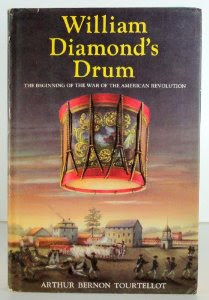
Mr. Vanderboegh,Here is a link to the digitized edition of Tourtellot’s book. The upper left hand box allows for downloading the entire book in a couple of different formats. .pdf, EPUB, Kindle etc.I am currently through reading about ¾’s of the book and wish to thank you for piquing my curiosity into searching for the book. My parochial school should have had me read this during my eighth grade history lesson and as well once getting into public school 9-12, I should have been required to read it during my senior year studies, and last but not least my college should have made it mandatory reading in freshman humanities studies.It is my belief that like myself, many other of your Blog faithful have no real connection to the book by your reference in posting titles, even though you recently posted a short excerpt of it. For the sake of enlightening as many citizens as possible about the facts surrounding April 19, 1775 and the ensuing actions resulting from that date, perhaps you would post the link on your Blog so that more people can also download and read the book?- Michael
Agreed, Michael. Everyone ought to read it and it is available at many public libraries.
Anti-gun Missouri legislator plays 'race card'--badly
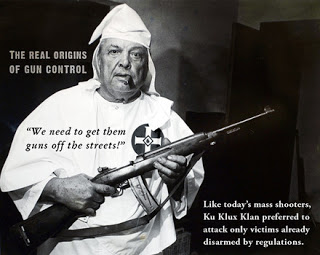
Is Chappelle-Nadal ignorant of the fact that the "KKK began as a 'gun control' organization," or is she deliberately suppressing that inconvenient fact, because it interferes with her agenda? Is she unaware of the fact that ethnic minorities still bear the brunt of the suffering inherent to forcible citizen disarmament, or is she comfortable in the role of "No guns for Negroes" enforcer?
William Diamond's Drum, Part Three: Gandhi with a gun. Resisting the Intolerable Acts. "If you are not prepared to take life, you must often be prepared for lives to be lost in some other way."
Had the Japanese got as far as India, Gandhi's theories of "passive resistance" would have floated down the Ganges River with his bayoneted, beheaded carcass. -- Mike Vanderboegh.
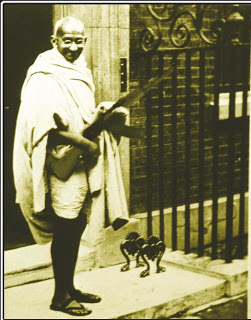
Today, William Diamond's drum again beats the long roll. We do not seek a civil war, but one is being thrust upon us. If we do not now stand, then when will we? We must defy these intolerable acts, whatever their source, and challenge the collectivist revolutionaries to come work their will upon us if they do not like it -- and they most assuredly won't. -- "Can you hear it yet? The Long Roll of William Diamond's Drum," Sipsey Street, 15 February 2013.
The Intolerable Acts -- the new nightmare citizen disarmament laws -- are gradually assuming corporeal form, both in the District of Criminals and various state houses around the country. The long roll of William Diamond's drum is once more heard in the land.
In Part Two of this series I concluded:
When these intolerable acts -- state or federal -- are enacted, we have the duty to defy them in armed civil disobedience. Those who do so should remember 19 April 1775 as a perfect example of what can happen when you defy a tyranny. History may not exactly repeat itself, but we darned well had better be ready to respond if it does.
And for what will we fight? Why the right to be left alone by an oppressive government which seeks -- and has in large measure succeeded -- to overthrow the Founders' Republic. We will fight, in a word, for liberty. H.L. Mencken said it best, I think:
I believe that liberty is the only genuinely valuable thing that men have invented, at least in the field of government, in a thousand years. I believe that it is better to be free than to be not free, even when the former is dangerous and the latter safe. I believe that the finest qualities of man can flourish only in free air – that progress made under the shadow of the policeman's club is false progress, and of no permanent value. I believe that any man who takes the liberty of another into his keeping is bound to become a tyrant, and that any man who yields up his liberty, in however slight the measure, is bound to become a slave. . . .Liberty in itself, to be sure, cannot bring in the millennium. It cannot abolish the inherent weaknesses of man – an animal but lately escaped from the jungle. It cannot take the place of intelligence, courage, honor. But the free man is at least able to be intelligent, courageous and honorable if the makings are in him. Nothing stands in the way of his highest functioning. He may go as far as nature intended him to go, and maybe a step or two beyond. Free, he may still be dull, timorous and untrustworthy. He may be shiftless and worthless. But it will not be against his will; it will not be in spite of himself. Free, he will be able to make the most of every virtue that is actually in him, and he will live and die under the kind of government that he wants and deserves. -- H.L. Mencken, “Why Liberty?”, Chicago Tribune, January 30, 1927.
We neither want nor deserve this government. It is anathema to the Founders' ideals and to our own natural, inalienable, God-given rights to life, liberty and property. We must and will defy its diktats. But how shall that resistance be carried out?
There are those in the so-called "gun rights movement" who believe that these intolerable acts are, well, tolerable. That just because that they are tyranny wrapped in the cloak of "law" means that we must obey them, or keep our heads down and "resist" them quietly, privately. Some folks I have talked with yearn for a non-violent way to do this. I sympathize with them -- but I do not agree. Perhaps it is because, having been a collectivist in my youth I see the nature of the beast more clearly -- the lies of the tyrants are more obvious, the smiles more clearly insincere, the slippery slope of universal firearm registration more plain to see.
We must peacefully protest while we can, certainly. The political fights are not yet done. But we must not deceive ourselves that these people can be deterred by Gandhian peaceful civil disobedience. Such tactics depend upon two things -- an independent press that is not in the tank for the regime and a regime that is not blindly arrogant and ignorant of its -- and its bureaucrats -- own long-term survival. Neither is true today. What shall we appeal to? "World opinion?" The international elites wouldn't even waste crocodile tears at our utter extinction. We are on our own, folks. Ourselves alone.
Those who point to the Civil Rights movement as a template for our own resistance also overlook the fact that the "non-violence" of the movement was never all that non-violent in toto. Martin Luther King and other "non-violence" advocates were only able to sleep soundly because they were guarded by the armed black militia, The Deacons for Defense and Justice. The federal government did not get aroused to send the FBI aggressively into the South to investigate Klan murders until the prospect of race war -- on the back roads of the South and in the cities of the North -- loomed larger and larger. Without the threat of violence, "non-violence" would never have had a chance.
Gandhi, then, was an historical anomaly. A magnificent one to be sure, but wholly a product of the opportunities provided by, and the weaknesses of, the British Raj. As George Orwell wrote in his "Reflections on Gandhi" (1949):
At about the time when (Gandhi's) autobiography first appeared I remember reading its opening chapters in the ill-printed pages of some Indian newspaper. They made a good impression on me, which Gandhi himself at that time did not. The things that one associated with him - home-spun cloth, "soul forces" and vegetarianism - were unappealing, and his medievalist program was obviously not viable in a backward, starving, over-populated country. It was also apparent that the British were making use of him, or thought they were making use of him. Strictly speaking, as a Nationalist, he was an enemy, but since in every crisis he would exert himself to prevent violence - which, from the British point of view, meant preventing any effective action whatever - he could be regarded as "our man." In private this was sometimes cynically admitted. The attitude of the Indian millionaires was similar. Gandhi called upon them to repent, and naturally they preferred him to the Socialists and Communists who, given the chance, would actually have taken their money away. How reliable such calculations are in the long run is doubtful; as Gandhi himself says, "in the end deceivers deceive only themselves"; but at any rate the gentleness with which he was nearly always handled was due partly to the feeling that he was useful. The British Conservatives only became really angry with him when, as in 1942, he was in effect turning his non-violence against a different conqueror. . .However, Gandhi's pacifism can be separated to some extent from his other teachings. Its motive was religious, but he claimed also for it that it was a definitive technique, a method, capable of producing desired political results. Gandhi's attitude was not that of most Western pacifists. Satyagraha, first evolved in South Africa, was a sort of non-violent warfare, a way of defeating the enemy without hurting him and without feeling or arousing hatred. It entailed such things as civil disobedience, strikes, lying down in front of railway trains, enduring police charges without running away and without hitting back, and the like. Gandhi objected to "passive resistance" as a translation of Satyagraha: in Gujarati, it seems, the word means "firmness in the truth." In his early days Gandhi served as a stretcher-bearer on the British side in the Boer War, and he was prepared to do the same again in the war of 1914-18. Even after he had completely abjured violence he was honest enough to see that in war it is usually necessary to take sides. He did not - indeed, since his whole political life centred round a struggle for national independence, he could not - take the sterile and dishonest line of pretending that in every war both sides are exactly the same and it makes no difference who wins. Nor did he, like most Western pacifists, specialize in avoiding awkward questions. In relation to the late war, one question that every pacifist had a clear obligation to answer was: "What about the Jews? Are you prepared to see them exterminated? If not, how do you propose to save them without resorting to war?" I must say that I have never heard, from any Western pacifist, an honest answer to this question, though I have heard plenty of evasions, usually of the "you're another" type. But it so happens that Gandhi was asked a somewhat similar question in 1938 and that his answer is on record in Mr. Louis Fischer's Gandhi and Stalin. According to Mr. Fischer, Gandhi's view was that the German Jews ought to commit collective suicide, which "would have aroused the world and the people of Germany to Hitler's violence." After the war he justified himself: the Jews had been killed anyway, and might as well have died significantly. One has the impression that this attitude staggered even so warm an admirer as Mr. Fischer, but Gandhi was merely being honest. If you are not prepared to take life, you must often be prepared for lives to be lost in some other way. When, in 1942, he urged non-violent resistance against a Japanese invasion, he was ready to admit that it might cost several million deaths.At the same time there is reason to think that Gandhi, who after all was born in 1869, did not understand the nature of totalitarianism and saw everything in terms of his own struggle against the British government. The important point here is not so much that the British treated him forbearingly as that he was always able to command publicity. As can be seen from the phrase quoted above, he believed in "arousing the world," which is only possible if the world gets a chance to hear what you are doing. It is difficult to see how Gandhi's methods could be applied in a country where opponents of the regime disappear in the middle of the night and are never heard of again. Without a free press and the right of assembly, it is impossible not merely to appeal to outside opinion, but to bring a mass movement into being, or even to make your intentions known to your adversary. Is there a Gandhi in Russia at this moment? And if there is, what is he accomplishing? The Russian masses could only practise civil disobedience if the same idea happened to occur to all of them simultaneously, and even then, to judge by the history of the Ukraine famine, it would make no difference. But let it be granted that non-violent resistance can be effective against one's own government, or against an occupying power: even so, how does one put it into practise internationally? Gandhi's various conflicting statements on the late war seem to show that he felt the difficulty of this. Applied to foreign politics, pacifism either stops being pacifist or becomes appeasement. Moreover the assumption, which served Gandhi so well in dealing with individuals, that all human beings are more or less approachable and will respond to a generous gesture, needs to be seriously questioned. It is not necessarily true, for example, when you are dealing with lunatics. Then the question becomes: Who is sane? Was Hitler sane? And is it not possible for one whole culture to be insane by the standards of another? And, so far as one can gauge the feelings of whole nations, is there any apparent connection between a generous deed and a friendly response? Is gratitude a factor in international politics?
No, it is not. Neither will it be for us, now, with our own self-styled "government." Our opponents, it is becoming clearer, wish us dead, or at least silenced. They cloak that essential truth with a bodyguard of lies. They believe, truly believe, that if they win the political argument in a rigged game in which both political parties participate that that will be the end of it -- they will have won and we will have lost. They do not respect us because we do not respect ourselves. Put another way, they do not respect us because they do not fear us as the Founders intended. Yet if we truly have the courage of our convictions and engage in armed civil disobedience, they will certainly come to fear us.
Mencken said, "I believe that any man who takes the liberty of another into his keeping is bound to become a tyrant, and that any man who yields up his liberty, in however slight the measure, is bound to become a slave."
This much I know: If you do not consent to your own enslavement, it is time for armed civil disobedience of these intolerable acts.
I, for one, do NOT consent.
Monday, February 25, 2013
A militaria collectible.
Sipsey Street has recently come into possession of a boatload of slightly dated US military manuals on a bootleg DVD -- nothing classified, of course, but darned useful stuff just the same. It strikes me that some readers who are behind on their voluntary subscriptions might be interested in obtaining a copy. Regular donors (and you -- and I -- know who you are) need only drop me an email or a snail mail with a USPS address to obtain a copy.
These DVDs contain the following Department of the Army Manual Sets:
EM 0178 General Publications (Current as of 1 November 2007)
EM 0045 NBC Equipment -- Masks, Detectors, Radiac Sets & Related Equipment (Current as of 1 November 2007)
EM 0093 Mines, Mine Clearing & Emplacement Equipment (Current as of 1 February 2008)
EM 0065 Mortars, Small Arms, Mounts & Related Equipment (Current as of 1 December 2007)
Altogether there are over 500 individual field and technical manuals on this disc. Since I will be responsible for the cost of mailing them out, is it too much to ask for a minimum donation of $20 to cover postage and handling?
Anyone interested can contribute by donating using the PayPal button on the right or by sending it to me via snail mail at PO Box 926, Pinson, AL 35126. Those who are more than up-to-date can email me at GeorgeMason1776ATaolDOTcom with their mailing address.
Praxis: DIY Weapons of the Syrian Resistance.

Interesting, to say the least.
Most interesting to me were the photos of the improvised mortar shell factory:

A man works on an improvised mortar shell for the Free Syrian Army inside a factory which previously manufactured steel and iron in Aleppo, on February 18, 2013. (Reuters/Hamid Khatib)
Obviously there is no functioning equivalent of the Syrian Occupational Health Safety Administration in Aleppo.

A Free Syrian Army member smokes a cigarette inside a factory producing improvised mortar shells, in Aleppo. (Reuters/Hamid Khatib)
Final inspection by sliding into the tube (presumably the firing pin has been removed):

And the Feds think that they can accomplish gun control HERE?
Thảm sát tại Huế Tết Mậu Thân. The True Face of Collectivism. 45th Anniversary of the Liberation of Hue City.

My daughter Zoe once got in trouble at school for defining the difference between communism and socialism. Not surprisingly, she repeated the short answer that I had taught her: "The difference between a communist and socialist is that a socialist is a communist who has not found his AK-47 and the will to use it, and a communist is a socialist with an AK-47 who IS ready to use it."
I was called by the "social studies" teacher on that one and went into the school for a visit. What, I asked was wrong with that answer? As he sputtered, I asked a second question. "Have YOU ever been a socialist or a communist?" "Well, no," he answered. "Let me tell you something then -- I have been BOTH a socialist AND a communist and believe me I know what I'm talking about and you most definitely do not." My daughter was not disciplined.
Today is the 45th Anniversary of the liberation of Hue City. Even before the city was reclaimed from the Communists, reports circulated of massacres committed by the Reds.From Wikipedia:
During the months and years that followed the Battle of Huế, which began on January 31, 1968, and lasted a total of 28 days, dozens of mass graves were discovered in and around Huế. The estimated death toll was between 2,800 to 6,000 civilians and prisoners of war. Victims were found bound, tortured, and sometimes apparently buried alive. . .A first summary was published for the U.S. Mission in Vietnam by Douglas Pike, then working as a Foreign Service Officer for the U.S. Information Agency in 1970. Pike identified three distinct phases for the executions in Huế. Phase one was a series of kangaroo court trials of local ARVN officials. The highly publicized trials lasted anywhere from five to ten minutes and the accused were always found guilty of “crimes against the people”.Phase two was implemented when the communists thought that they could hold the city long-term, and consisted of a campaign of “social reconstruction” along Maoist dogmatic lines. Those who the communists believed to be counterrevolutionaries were singled out in this phase. Catholics, intellectuals, prominent businessmen, and other “imperialist lackeys” were targeted in order to “build a new social order”.The last phase began when it became evident that the communists could not hold the city and was designed to “leave no witnesses”. Anyone who could identify individual VC members who participated in the occupation was to be killed and their bodies hidden. . .Captured Viet Cong documents boasted that they had "eliminated" thousands of people and "annihilated members of various reactionary political parties, henchmen, and wicked tyrants" in Hue. One regiment reported that its units alone killed 1,000 victims. Another report mentioned 2,867 killed. Yet another document boasted of over 3,000 killed. A further document listed 2,748 executions.
Always remember that this is the true face of collectivism. Behind the lying smiles and soothing words, the only definition of "peace" that collectivists of any stripe agree upon is when all their political enemies are dead or in prison. Remember the victims of Hue, 1968. And never, ever, believe that collectivism is anything other than a death cult.
E.J. Dionne's Premature Ejaculation on Gun Control.
Latest from the Lisping Liberal: "The Miracle on Guns."
Sunday, February 24, 2013
Beckel latest in long line of rape-enabling gun-grabbers

Bob Beckel, long-time citizen disarmament advocate, considers hanging himself, but chickens out. I guess we'll have to have the war crimes trial for him after all.
"When's the last time you heard about rape on a college campus?"
Now, Bob, THIS is what the results of a proper "journalist" hanging looks like:

Julius Streicher, Hitler's favorite "journalist," after dancing the executioner's jig at Nuremberg, 1946.
Slush fund for gun control.

More names for the naughty list.
Obama’s Backers Seek Big Donors to Press Agenda
President Obama’s political team is fanning out across the country in pursuit of an ambitious goal: raising $50 million to convert his re-election campaign into a powerhouse national advocacy network, a sum that would rank the new group as one of Washington’s biggest lobbying operations.But the rebooted campaign, known as Organizing for Action, has plunged the president and his aides into a campaign finance limbo with few clear rules, ample potential for influence-peddling, and no real precedent in national politics.In private meetings and phone calls, Mr. Obama’s aides have made clear that the new organization will rely heavily on a small number of deep-pocketed donors, not unlike the “super PACs” whose influence on political campaigns Mr. Obama once deplored.At least half of the group’s budget will come from a select group of donors who will each contribute or raise $500,000 or more, according to donors and strategists involved in the effort.Unlike a presidential campaign, Organizing for Action has been set up as a tax-exempt “social welfare group.” That means it is not bound by federal contribution limits, laws that bar White House officials from soliciting contributions, or the stringent reporting requirements for campaigns. In their place, the new group will self-regulate.Officials said it would voluntarily disclose the names of large donors every few months and would not ask administration personnel to solicit money, though Obama aides will probably appear at some events.
And what "advocacy" are they going to start with? Why gun control, of course.
“There are wins we can have on guns and immigration,” Jon Carson, the group’s new executive director, told prospective donors on a conference call on Wednesday, according to people who participated. “We have to change the conventional wisdom on those issues.”
Keep track of those names, citizens. They may come in handy someday.
The shape of the sellout by the Dead Elephant Party.
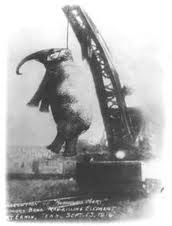
Senators near a deal on background checks for most private gun sales.
You Oklahomans need to crawl Coburn's ass for this one.
Saturday, February 23, 2013
"Illinois House Democrats have a come to Jesus moment on guns yesterday."
Specifically, House Democrats were told that Illinois would effectively have “Constitutional Carry” where anyone who was eligible to own guns could carry them freely in public without training, licensing, qualification and precious little in the way of restriction.
After a lot of back and forth, one Chicago Representative asked if someone could carry a loaded rifle into the Statehouse. He was told “Yes”.It was reported that you could hear a pin drop for an uncomfortably long time after that as a stunned silence came over the room.
Friday, February 22, 2013
Pay no attention to the Roman god behind the curtain. Chuck Todd's "Mythology."
"Orcus (Latin: Orcus) was a god of the underworld, punisher of broken oaths in Italic and Roman mythology. As with Hades, the name of the god was also used for the underworld itself. . . . Orcus was portrayed in paintings in Etruscan tombs as a hairy, bearded giant."

Orcus in the Gardens of Bomarzo, Italy.
Chuck Todd: It's 'Mythology' That MSM Hostile To Conservatives.
Right after the broadcast, Todd headed to the local Temple of Orcus to worship.
Thursday, February 21, 2013
William Diamond's Drum, Part Two: Armed Civil Disobedience.
Last week, I introduced readers to William Diamond's drum in both the historical and present-day contexts.
I have been working behind the scenes with folks who are planning armed civil disobedience actions against all of the various state and federal "intolerable acts" that have been already enacted or are coming down the pike. This has been the subject of some thought as I contemplate the odds of participating in these actions (which I certainly will) and still seeing my 61st birthday in July.
As always, I return this week to the Founders, who still have much to teach those of us who would be faithful to their intentions for this Republic and who have sworn to resist the collectivist usurpers who are bent upon overthrowing it.
Again, from William Diamond's drum by Arthur Bernon Tourtellot:
Lexington, April 25, 1775I, John Parker, of lawful age and commander of the Militia in Lexington, do testify and declare, that on the nineteenth instant, in the morning, about one of the clock, being informed that there were a number of Regular Officers riding up and down the road, stopping and insulting people as they passed the road, and also was informed that a number of Regular Troops were on their march from Boston, in order to take the Province Stores at Concord, ordered our militia to meet on the common in said Lexington, to consult what to do and concluded not to be discovered, nor meddle or make with said Regular Troops (if they should approach) unless they should insult us; and upon their sudden approach, I immediately ordered our Militia to disperse and not to fire. Immediately said Troops made their appearance and rushed furiously, fired upon and killed eight of our party, with out receiving any provocation therefor from us.John ParkerMiddlesex, April 25, 1775The above named John Parker personally appeared^ and after being duly cautioned to declare the whole truth, made solemn oath to the truth of the above deposition., by him subscribed. Before us,Wm. ReedJosiah JohnsonWm. StickneyJUSTICES OF THE PEACE
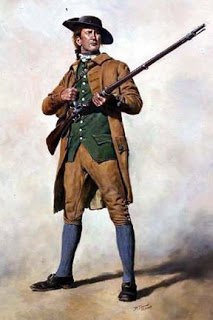
This is all that Captain John Parker ever said of the affair, and it all leads up to a giant contradiction. He telescopes time a little bit; it was "one of the clock 33 when he got the news and, shortly after that when he ordered the muster of the minutemen on the Common "to consult what to do," and then he dismissed the company. Three hours, at least, passed before he mustered them again three hours during which he had time to talk with Hancock, Adams, and Clarke. His first instinct not to act like an authoritative military commander but to "consult" with his neighbors and friends "what to do" was a perfectly natural one. The minutemen were not easy men to order around. They were less a military company than a voluntary, self-governing unit resourceful, responsible, unafraid, but a collection of men who had no bosses in their ordinary daily lives and who did not lend themselves very readily to the mechanical response to orders snapped at them by someone else. If Parker hadn't known this, they would never have elected him their captain. They knew that he was the kind of man who would, in an emergency involving them as much as him, "consult what to do."For his part, Parker, having lived all his life in Lexington, knew these men who constituted his little militia well. He had gone to school with them, went to church with them, fought alongside some of them in the French and Indian wars, and was related either directly or by marriage to many of them. The last thing that would have occurred to him was that the relationship between him as their captain and them as members of Ms company could be as brisk and cold and automatic as that between a regular officer and his troops. And Parker knew enough also about war in the still heavily wooded American countryside to understand that, if war came, the cause of the colonies would be less dependent upon the parade ground discipline of the militia than upon those very characteristics of individualism, independence, and resourcefulness that made them unlikely exhibits on a parade ground but hard men to beat in country warfare.So John Parker consulted with these men, this varied assortment who had paid him the compliment of electing him their captain. They concluded not to make themselves conspicuous or to "meddle" with the British troops; and then they went home, or dozed around Buckman's, until they were called again. Parker obviously kept busy. He sent one messenger after another to find out and report to him whether the British troops were on the Lexington-Cambridge road and how far away. Dorothy Quincy remembered that Hancock went down to the Common. It can be taken as certain that, if he went, so did Samuel Adams, who would never have let him out of sight in the midst of such promising events ; and Clarke would have guided them down the road from the parsonage, around the corner of the Common to Buckman's. The captain of the militia would have discussed the night's affairs with the President of the Provincial Congress and with the Delegate to the Continental Congress and with his own pastor. And it was concluded, from the evidence of what happened afterward, that the minutemen would make a show of strength on the open Common, but that they would not fire. Apparently they would just stand there, as seven hundred British soldiers, on their first expedition after a year's dreary occupation of an isolated peninsular port town, marched harmlessly by a few feet away. Whatever anyone else thought of this placid picture, Samuel Adams, who had a profound understanding of the abrasive qualities inherent in such a situation, knew better. All his ten years' experience with the Boston mobs, all his careful manipulation and channeling of the prides and prejudices, strengths and weaknesses, capacities and limitations of human beings as parts of a group would have gone for nothing if he hadn't known better. And, what was worse, so would have the unbelievably single-handed success of Samuel Adams, thus far, in keeping the issue of revolt against Great Britain alive in the colonies.Parker's men took a suicidal stand, and the issue burst fully into life. When the approach of the British was unmistakable, he had sent young William Diamond to beat the call to arms. He met the assembling men on the Common and told Sergeant Munroe to draw them up in the two long thin lines to make them look more formidable in numbers than they really were. Having perhaps twenty minutes from the time that Thaddeus Bowman came to him with the last intelligence of the morning until the British were upon him, he made no effort to get his men into the readily available positions in adjacent pastures and woodlands from which they could have both observed the British and had the advantage of surprise and mobility in case of conflict. But he lined them up on the Common, with orders not to fire.All this was as it should be if one understood Adams' growing problem of unifying the colonies behind some incontrovertible event that would make it clear to any American colonist that life under the British was utterly impossible. Adams, of course, was familiar with all the rabble-rouser charges against him and knew also that many of the Middle Atlantic and Southern colonists, sympathetic and active in the colonial cause, regarded him as an inciter of mob actions when it suited his political purposes. But this time he had something to go on. He was fresh from a meeting of the Provincial Congress that had just decided, not without his guidance, "that should any body of troop with artillery and baggage, march out of Boston, the country should instantly be alarmed, and called together to oppose their march to the last extremity. Adams would be willing to take a chance on the expeditionary forces of the nineteenth having artillery or baggage with them.If after his original consultation with his minutemen on the Common at the first alarm Parker was advised by the high leadership concentrated by chance in Lexington that night, not having any other authority over him and no military superior present, he would have seen it as appropriate and fitting to acquiesce. His own military experience would have made him realize that a company captain is not a general or a strategical staff. But once the British started to move toward his men, from the road on to the Common, he felt as any company commander and ranking officer present would: the situation, including their safety, was entirely his responsibility. And he ordered them, not to stand their ground and not to fire, but to disperse. It was the only battle order that he said he gave; and it was the only one that any officer in his situation could have given. As it turned out, it served Adams' cause just as well. - Tourtellot, pp. 124 127
Adams, Tourtellot concludes, changed Parker's original orders, intending the demonstration to be one of armed civil disobedience, daring the British to do anything about it.
Full of bloated intelligence that had from five hundred to a thousand militia concentrated in Lexington to mow them down, the five British advanced light infantry companies, with Major Pitcairn in command, moved into the straight stretch of the road from which the Common was in sight. Their guns were primed and loaded. They expected a fight. Pitcairn, with some of his mounted officers, rode up to the head of the column. . .As he saw this group on the Common, Major Pitcairn, a man of quick and sound judgment, saw clearly enough how to handle it. He ordered his soldiers not to fire but to surround the motley group and disarm it. He did not even want to capture them. In the first place, he regarded the whole thing as a civil action, involving not an army but British subjects in violation of the government's laws; in the second place, there were specific orders not to molest the inhabitants; third, the purpose of the expedition was to destroy the stores at Concord and to get back to Boston; finally, no provision was made for the taking or transporting of prisoners. On the other hand, he could not just let them go away with their arms, possibly to follow his line of march to Concord, taking potshots at his troops on the way. So he did what had to be done: "I instantly called to the soldiers not to fire but to surround and disarm them." By this time some of Parker's men had heard their own captain's almost simultaneous order to disperse : "I immediately ordered our troops to disperse and not to fire."There were then, so far as the testimony of both commanding officers go, only two orders given. Both included the directive "not to fire." That these were the orders given was confirmed on both sides. Lieutenant Sutherland, who was one of the mounted officers close to Pitcairn, wrote: "I heard Major Pitcaim's voice call out, 'Soldiers, don't fire, keep your ranks, form and surround them." And Ensign de Berniere, in the first company of light infantry: "He ordered our light infantry to advance and disarm them." As the light infantry moved to the right of the meetinghouse and between it and Buckman's Tavern, toward the militia, somewhat behind the meetinghouse. Major Pitcairn and his group of mounted officers galloped their horses around the left of the meetinghouse. This was a sensible tactic for Pitcaim, because it would put him to one side of both forces, in ready hearing range of either, it still being a point of some consequence to him that the colonists were as much subjects of the King as the troops were. There he repeated his order to his own troops, and he told the colonists to lay down their arms.Those of Captain Parker's company who were on the Common had heard his order to disperse, and they started to break ranks. But they did not disperse in a very orderly or uniformly prompt manner "many of them not so speedily as they might have done," said Jonas Clarke. Men like these were not apt by training or by nature to react instantly or uniformly. Besides, some of them who had grown up with John Parker would be much more apt to consider an order from him a strong suggestion than an absolute directive. A few would do as they pleased. . . Others of the company drifted slowly toward the edges of the Common, taking their muskets with them. Some hurried away at Parker's order, but they also took their guns. No one followed Pitcairn's order to lay down his arms.While this somewhat straggling performance was going on, the British light infantry, in the custom of the day, started shouting as they charged forward. Someone, possibly one of the provincials off the Common, fired a shot. Perhaps it was meant to be an additional alarm a common practice since the days of Indian raids. Or perhaps a British soldier, carried away by the excitement, fired at the minutemen. Or else a young officer backed up an order to the minutemen to lay down their arms with a warning shot from his pistol. Or possibly someone's musket flashed in the pan by accident. -- Tourtellot, pp. 127-133.
Sam Adams, Tourtellot concludes, then had his war. Whatever the truth of the matter as to who fired first, it was the Colonists' narrative (delivered first to London aboard a fast ship, beating Gate's report by a couple of weeks) which prevailed.
I agree with Tourtellot's view, that the Lexington militia company was deliberately drawn up in a demonstration of armed civil disobedience aimed at giving the British the chance to fire first and concede the moral high ground. If it was Sam Adam's idea, he succeeded beyond his wildest dreams. Just as he had succeeded in manipulating the Boston Sons of Liberty in mob actions since the Stamp Act almost ten years before.
That's the history lesson. Here's how it applies today. When these intolerable acts -- state or federal -- are enacted, we have the duty to defy them in armed civil disobedience. Those who do so should remember 19 April 1775 as a perfect example of what can happen when you defy a tyranny. History may not exactly repeat itself, but we darned well had better be ready to respond if it does.
Logistics: Jerusalem Artichoke -- Source for food, fodder and fuel.

A friend of mine has been doing some research on the Jerusalem Artichoke.
This plant (weed) is a potential source for human food, animal fodder as well as liquor and motor fuel. I must say I'm intrigued by the possibilities. I'll let you know when he has completed his researches with the results.
St. Louis teenager suspected of 'knockout game' violence picks wrong victim
This reminds me of the old joke about atheist Madalyn Murray O'Hair. "What did Madalyn Murray O'Hair say as she faced her Maker thirty seconds after she was murdered by one of her followers?" "Uh, oh."
China at War With U.S. - & We're Not Fighting Back
From Ralph Peters referring to this.
The only people who will benefit from an American civil war are our traditional collectivist enemies overseas. You have to wonder if that's not the whole purpose of our domestic enemies.
Recommended Reading
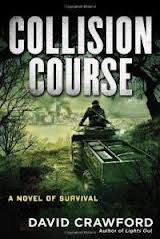
The other day I received from Matt a box of clothing and reading material that he sent from Afghanistan as his date of return to the World nears. Among the books was Collision Course by David Crawford. As you know, I always have need of diversionary reading for my chronic insomnia, so I picked this one up one night and found I couldn't put it down until I finally fell asleep. The next night I finished it, and I must say that as end-of-the-world novels go, I was interested in the character development and twists of plot that Crawford constructed from what could have been a garden-variety tale (as so many TEOTWAWKI novels often are).
I will not spoil the story for you, but it revolves around two characters, one initially wholly unsympathetic and the other the nominal protagonist. You may surmise correctly from the title that these two characters are destined to meet, and yet by the time they do, nothing is as it had seemed in the beginning.
A good read.
Wednesday, February 20, 2013
Colorado dusts off IL State Police rape prevention tip: Messy bodily functions
Rough night, overslept, another doctor's appointment this morning.
I'll have more later, but right now I'm behind and getting behinder.
Tuesday, February 19, 2013
Monday, February 18, 2013
Keeping Up With "Killer Tomato" Cass Sunstein
"Sure as I know anything, I know this - they will try again. Maybe on another world, maybe on this very ground swept clean. A year from now, ten? They'll swing back to the belief that they can make people... better. And I do not hold to that. . . I aim to misbehave." -- CPT Malcolm Reynolds, Serenity, 2005.

Long-time readers may recall my earlier posts on "Killer Tomato" Cass Sunstein. Now that he is out of the Obama administration, he is writing tyranny-justifying book reviews for the New York Times: It’s For Your Own Good!
Back in stock: RWE's III Patches
.jpg)
From Raven's Wood Enterprises comes this announcement:
Raven's Wood Enterprises has received a significant number of requests for the "III" patch and so here's the updated and improved original "III" patch, Audentes Fortuna Iuvat (Fortune Favors the Bold) will be available on 1 March 13 for a limited run to gauge interest.Patches are $6 each post paid, and orders are accepted for cash (sender's risk), USPS money order, certified or cashier's checks made out to:Raven's Wood Enterprises, LLC.PO Box 962Birmingham, MI 48012Orders should include a note with a shipping address, and the number of patches ordered equal to the total amount in the envelope.Example: Order for 3 patchesNote:Send 3 patches to J. Public1234 Main StreetAny Town, USA 00000$18 enclosedCash, USPS Money Orders, certified and cashier's checks processed and shipped immediately; personal check orders held for 10 days until cleared by RWE's bank.
The best-laid schemes of collectivist gang aft a-gley.
"Obama and Bloomberg Together May Unarm the NRA."
There they go again, thinking that this argument over the Founders' Republic is going to be settled by mere political sleight of hand. (See previous post about ammunition sales.)
They just don't get it, do they?
"Gun dealers report shortages of ammunition."
My old Econ 101 professor at Franklin University, William Jennings Bryan, Junior, (don't laugh -- his daddy was a first-generation American from Lebanon, who fled the old country because of political and religious persecution and who took WJB's moniker because he admired the man from our history) taught me that except in cases involving sex and love, all economic transactions were rational. What is apparent from this article is that no one comes close to understanding (or, being willing to speak the uncomfortable truth about) the rationale behind the current market run on firearms and ammunition.
Folks are buying weapons like there is no tomorrow because they believe that there will be no tomorrow. The name for that uncertainty is, at best, economic collapse and at worst civil war.
The evidence is right in front of their faces and they do not, cannot, see it.
Oh, well, back to the reloading bench.
Sunday, February 17, 2013
The Gathering Storm

President Obama has set in motion forces that he can't handle.
This is the point: a perfect storm is brewing. I think we're heading for a chaotic and violent period in this country the likes of which no one alive today has ever witnessed. If I'm right, conditions will be ideal for criminals to ply their craft, and President Obama is pushing for gun control at precisely the wrong moment.I believe that what I have described is realistic and unfortunately inevitable, and that brings me back to my back to the president. He has set in motion forces that he can't handle, and all of us are going to suffer the consequences so get ready for a wild ride.
Would New Gun Laws Spark Widespread Civil Disobedience?

"So, you thought you had me figured for a pushover?"
Will New Gun Laws Spark Widespread Civil Disobedience? Yup, you betcher ass it would.
Coming soon to a street theater near you:
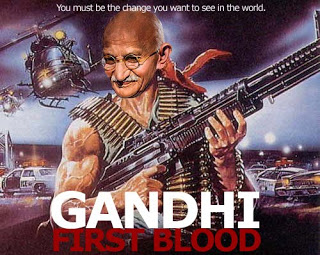
Miami Police Endorse "Shooting to Wound" as a policy -- for citizens.
Homeowner Walked in on Burglars, Shot Suspects.
"Absolutely, something that we're seeing that was quite cleaver from that homeowner is what he did was shoot them in the legs to immobilize them. So, clearly, these two men, who have an extensive past for home invasion robberies, are behind bars today simply because the homeowner chose for them to have life and just immobilize them," said Kenia Reyes, spokeswoman for Miami Police."
I guess the cops are just grateful for some more repeat business in the future. The reader who forwarded me this link had this cogent comment:Sorry, Police.....WRONG ANSWER. You ALWAYS shoot to kill.What if the invading suspect(s) had been armed with concealed weapons and returned fire? Zzzzt. GAME OVER.I'll also be surprised if the gun owner is not sued.(It's happened before.)
Saturday, February 16, 2013
Confirming the final step in its Kalifornication process, Colorado passes magazine ban, as MagPul announces it is leaving the state.
FOX reports: Colorado House approves high-capacity magazine ban, despite GOP objections. MagPul announces it is voting with its feet. However, the Democrat legislature threw them a bone:
"Democrats amended the bill to allow Magpul to continue to manufacture high-capacity magazines in Colorado for sale in other states, but the company remained opposed to the ban."
We'll see if MagPul has the courage of its announced convictions.
I'd like to hear from Coloradans on whet they intend to do about this intolerable act. Either comment here of email me at GeorgeMason1776AT1olDOTcom.
Friday, February 15, 2013
More black-robed collectivist ideologues on the way.

Obama Attempting to Change Face and Ideology of the Judiciary. Somewhere in Hell, Karl Marx is laughing.
Can you hear it yet? The Long Roll of William Diamond's Drum
The Long Roll: (Mil.) A prolonged roll of the drums, as the signal of an attack by the enemy, and for the troops to arrange themselves in line.
"And having met at the place of our company's parade., [we] were dismissed by our captain, John Parker, for the present, with orders to be ready to attend at the beat of the drum." -- Deposition of Lexington Minuteman Nathaniel Mulliken.
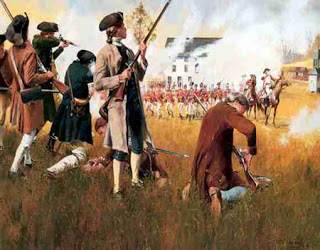
After a restless night of alarms, counsels, musters and dismissals of militia, mysterious couriers, intelligence and counter-intelligence, a forty-five-year-old veteran of Rogers' Rangers in the French and Indian wars, Captain John Parker, commanding the Lexington minutemen, directed his drummer boy to go across the road to the Common and beat the call to arms. And when William Diamond, bringing the enthusiasm of his sixteen years to the beating of his gaily emblazoned drum, rolled out the call to the village's minutemen, the War of the American Revolution began. . . As William Diamond continued to beat the call on his drum, the Lexington minutemen perhaps thirty of them assembled on the Common. Captain Parker directed Orderly Sergeant William Munroe to form the men in ranks. . .The rolling beat of William Diamond's drum began to drown out, in the ears of the approaching British, the soft thud of their own marching feet on the unpaved roadway. Aware that the drum was sounding a military assembly, the British officers halted their troops, the light infantry in front and the grenadiers in the rear. Orders were given to stop, prime and load their guns, double their ranks, and then to proceed again at double-quick time. -- William Diamond's Drum by Arthur Bernon Tourtellot.
William Diamond's drum is sounding the long roll once again, and it doesn't take much imagination to hear it. As the collectivists in the Federal government attempt to roll the Dead Elephant Party into banning the private sale of arms (and it looks like it won't take much effort), states like New York, Colorado and New Mexico are rushing headlong into their own versions of the same Intolerable Acts. We are thus confronted with the end of what Claire Wolfe called "the awkward stage."
"America is at that awkward stage. It's too late to work within the system, but too early to shoot the bastards." – 101 Things to Do 'Til the Revolution (1996)
The enforcement of these various odious, unconstitutional laws -- whether state or federal -- will be resisted, flaunted and then Leviathan, which can't afford to look silly, will come to kill us for our temerity.
This is not paranoia, but merely the natural order of things in our new collectivist state of Amerika. Don't believe me? Ask a Davidian, if you can find one still alive.
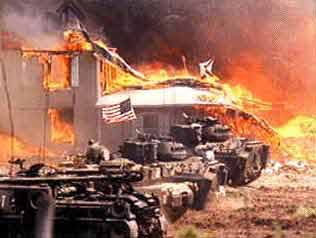
For understand, what we seek is not a revolution, but a counter-revolution -- against the collectivists who have been hacking, gnawing and biting at the supports of the Founder's Republic and their vision of the rule of law for over a century. Like the Founders, we -- who only wish to be left alone with our liberty and property intact -- must seek a restoration of their vision and secure our liberty once more for ourselves and our posterity.
(By 19 April 1775), revolution in the minds of the people of Lexington had already been almost fully achieved. The revolt was of a philosophic nature, skillfully and positively phrased in philosophic terms and on the whole neither inflammatory nor overly emotional in either content or language. The public papers of Lexington, tracing the evolution of the town's opinion, are great state papers, written in the neat orderly hand of Jonas Clarke; and they paralleled, when they did not actually anticipate, the great papers of the colonies as a federation. In the opinion of Lexington there was little doubt left that Britain by her acts had shattered her own traditions, dating from the barons at Runnymede, of a free society. In the Coercive Acts of 1774 (which, in addition to closing the port of Boston, revoked the Massachusetts charter, transferred trials to England or to other colonies, and quartered soldiers on the inhabitants without their permission) the people of Lexington saw the revolution as really one launched by the British Parliament against a wholly British heritage. And in their minds the movement in the colonies, all their acts and resolves, was a counterrevolution to restore centuries-old freedoms and safeguards against tyranny. . .But it was clear to Jonas Clarke and thus to his townsmen, as events progressed, that no debate of the issues was to lead to any final solution. The ministry of Lord North was proceeding as if it had nothing but contempt for colonial opinion and was bankrupt of any expedient but force. The reaction in Lexington was inevitable. Having already concluded, "We shall be ready to sacrifice our estates and everything dear in life, yea and life itself, in support of the common cause," they voted at last, abandoning faith in the power of reason for the comfort of practical measures, to strengthen their arms and militia with "a suitable quantity of flints . . . two pieces of cannon ... (and) a pair of drums."
One of those was young William Diamond's drum, upon which he beat the long roll and ushered in what we now call the American Revolution but which was, in fact, a glorious counter-revolution against a corrupt regime in violation of its own English Constitution.
Today, William Diamond's drum again beats the long roll. We do not seek a civil war, but one is being thrust upon us. If we do not now stand, then when will we? We must defy these intolerable acts, whatever their source, and challenge the collectivist revolutionaries to come work their will upon us if they do not like it -- and they most assuredly won't. We must give a final rattle of the tail before striking. They may pass whatever "laws" they wish, then watch what happens when they try to enforce them. The next moves will be up to them. May God have mercy on their corrupt, heathen murderous souls, for they are unlikely to receive any in the ghastly civil conflict their tyrannical appetites seem to crave.
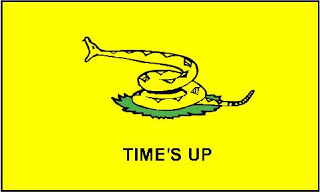
Enter the SCAG -- Federal Legal Whore for Firearm Confiscation. “Federal agents are immune from state prosecution even when their conduct violated internal agency regulations or exceeded their express authority.”
"SC Attorney General: Come Get the Guns!"
In an opinion requested by Kershaw County Sheriff Jim Matthews, SC Attorney General Allan Wilson suggest that if federal gun confiscation was ordered that neither state law nor state law officials may interfere or otherwise impede federal law enforcement officers as they perform their lawful duties. Sighting (sic) many examples of case-law (incremental social engineering by the use of precedent to move public policy) Wilson makes the case for federal supremacy, when and if the federal government should choose to enforce, whatever law that is passed. The seven page opinion was prompted when concerned residents asked the sheriff if he would take their guns if federal law required it. “A lot of sheriffs want to be able to fall back on what the AG says on what we lawfully have to do or don’t have to do,” Matthews said in a State paper interview. The report also states Matthews said it’s pretty clear that sheriffs do not enforce federal laws, and he doesn’t believe that he can stop federal agents from coming into his county to enforce them.With this opinion by the SCAG, state law enforcement will not stand in the way of gun confiscation.
Bringing the War Back Home. "Cybersecurity": White House Moves to Counter Online "Radicalization."
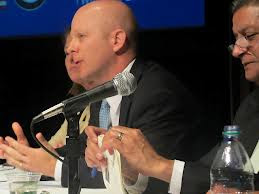
The face of the banality of evil. Quintan Wiktorowicz, the White House Senior Director for Community Partnerships on the National Security Staff
“Violent extremist groups ─ like Al Qaeda and its affiliates and adherents, violent supremacist groups, and violent “sovereign citizens” ─ are leveraging online tools and resources to propagate messages of violence and division,” stated Wiktorowicz.
What they are doing, of course, is conflating folks like us with Al Qaeda, the final culmination of Professor Churchill's "Narrative of 1995" -- all the better to justify the use of drones and "decapitation" strategies domestically. This is about shaping the battlefield of the coming civil war. They understand that a civil war is coming, for they are the ones eager to start it -- the fools.
Thursday, February 14, 2013
Sold out by a Dead Elephant Party governor who ought to know better. Bob Wright reacts to the New Mexico version of an Intolerable Act.
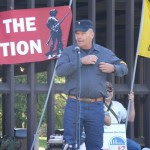
Bob Wright at Fort Hunt Park, 19 April 2010.
Here's the bad news for New Mexicans: "New Mexico House votes to close gun show loophole."
New Mexico's House of Representatives approved tighter background checks on firearms buyers at gun shows, joining other states in considering more restrictions on weapons following the Connecticut school massacre.Representatives voted 43-26 on Wednesday to advance the measure, which was expected to be approved by the Democratic-controlled state Senate and Republican Governor Susana Martinez, a gun rights advocate who has said she would sign the bill if it reaches her desk.
Not surprisingly, this does not make my old friend Bob Wright of the 1st Brigade, New Mexico Militia, very happy:
An Open Letter to Senator Carroll Levell, and all Senators in the New Mexico LegislatureSoon you will be asked to vote on HB 77 or its equivalent in the Senate.I ask that you vote 'NO' on this odious attempt to infringe upon the God Given Rights of free New Mexicans.As you know, Senator, the only mechanism the Federal Government could use to regulate firearms in America was a highly controversial and very cynical reading of the Interstate Commerce Clause. The reason there is no federal requirement for the individual to do background checks is because once purchased from the Federally Licenced Firearms dealer, the weapon is no longer in Interstate commerce. It is now the Private Property of the purchaser.HB 77, would undue that protection and require the citizens of this state to pay a financial fee to a Federally Licenced Dealer. That fee would process a request to a Federal Bureaucrat in order to sell their own property.There are no reliable studies that suggest criminals get their guns through private sales and, therefore, there is NO compelling reason to infringe upon the 2nd Amendment protections or the private property rights of the Citizens of this great state.In addition, this misguided and deceptive law would, defacto, create a gun owners database with its requirement to maintain records.Finally Senator, the right to keep and bear arms uninfringed is enshrined in our Bill of Rights and CANNOT legitimately be encroached upon. This is by any definition an encroachment.Passage of this bill will disregard the intent of both the Federal and State Constitutions, dishonor the blood sacrifices of our forebears who fought to defend these very rights, and it will betray the peaceful and law-abiding citizens of this great State and bring shame upon the Senate in which you serve. I know you share a love of our beloved Constitution and trust that it is that which will guide your vote in this matter. Thank you for your time senator.Bob Wright
Looks like Bob may have to organize a Fed-free AND a state police-free gun show. Now that's something I'd go back out to Fort Stinking Desert to help with.

Subscribe to:
Posts (Atom)
